The modern world has made the concept of ownership a fact of life. From the moment we’re born we are indoctrinated with the ideas of what is yours and what is mine and the terrible twos are when we generally fall in love with the concept of “mine!” Some people developed further into that aspect of the human condition than others of course and they are taking possession of things that should never be owned.
Artists Get Scammed
Most people are familiar with the war being waged between record companies, artists and their fans. Legal battles have been taking place every day since the MP3 was born over who has the right to listen to what. The same battle for video started the moment YouTube and other streaming sites entered the scene.
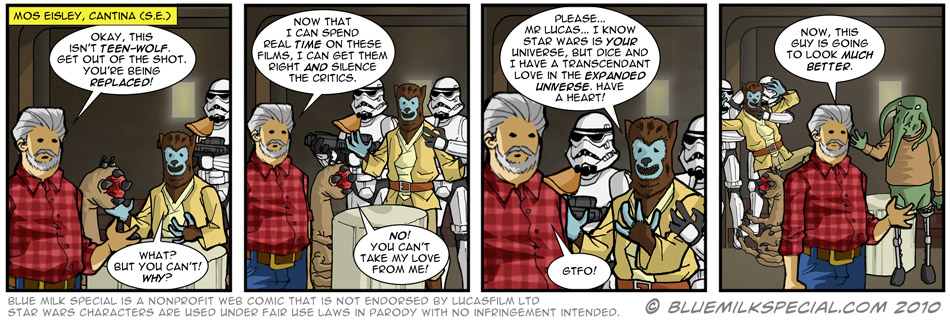
Entertainment is one of the biggest industries we have in America and the entire process is owned by a few absurdly rich people. Every record company executive and movie studio owner has their artists by the balls. Musicians, Writers, and Directors either follow the rules and desires of these executives or their art will never see the light of day. These rules include censorship and royalty rights. When you buy a CD at Wal-Mart or download a song from iTunes, less than a penny of that money goes to the artist most of the time. The people whose creativity and passion made that song or album great get little to nothing while lawyers, agents, and fat cat businessmen divvy up the spoils.
And then we have the distribution agents that seek to leash you to their products with restrictions and legal text. Because of the DRM that record companies forced Apple to put on iTunes tracks, I can’t even share my music that I legally purchased with Kati without sharing my iTunes account information with her. While I trust her with my account, I don’t see why I shouldn’t be able to play the same music that I purchased on a different set of speakers in the same apartment without hitting ‘I Agree’ a hundred times. We’re signing our souls and freedoms away little by little to Steve Jobs over the net. Apple is a huge corporation just like any other that masquerades as a cute friendly building full of artists and designers. Artists and designers just want their work to be seen and appreciated. They don’t want their work to only be seen by people who have a piece of fruit tattooed to the side of their heads.
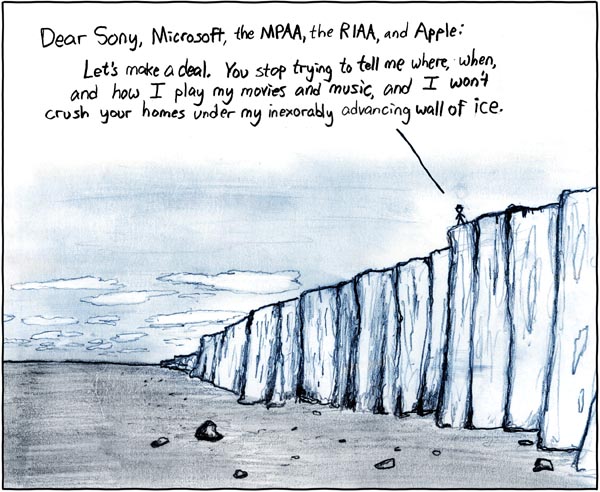
Netflix lets me stream movies to pretty much anything I want as long as I pay my bill every month. I can let Kati watch videos on my Xbox 360 in Maryland while I mindlessly drone through seasons of Weeds and Dexter on my PC in Vegas. They do the best they can to have their content delivered on every possible platform to be good to their audience. When I download music from Amazon, they give me an MP3 file that I can do whatever I want with. I can send it to Kati, drop it on any Portable player I want, and even import it into an Audio Production program and mess with it if I want to. They charge no more than Apple does. Any company that does the best it can to force you into buying only their products and services with restrictive software or customer unfriendly policies is obviously not putting their audience first. Don’t give them your money.
Art should be as direct a connection between the performer and the audience as possible. A lot goes into putting that connection together sometimes, but the important people in the equation are the beginning and the end, not the middlemen that function as the wire between the music player and the headphones. That connection deserves credit and payment for its service, but they should NEVER overshadow the source or the audience. We live in a culture of lawyers and other con artists seeking to profit from other people’s work. If I design an awesome poster that I put a lot of time and effort into, should the guy who supplied the paper and printed it get a cut of the JPEG downloads I sell through iStockphoto? Audiences should do the best they can to make sure their money goes to the right places. (Interesting discussion and article) Ideally, royalties should ALWAYS go to the artists.
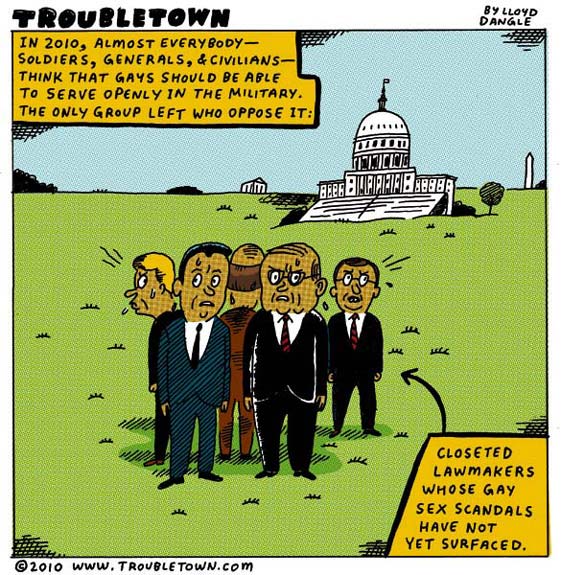
The best art is passionate, honest, innovative, and new. You only hear new things when you look in new places. Buy concert tickets. If you buy music –digital or CD– order it from the artist web site to maximize their cut. Donate to bands that share their music online for free. Buy lots of drinks when you go to local shows with talented unsigned bands performing.
Keep Your Patents Off My Body
20% of your DNA is owned by someone else. Did anyone ask you permission? Do you get a cut of the profits those companies make from using your genes? What kind of emotions do you experience when you consider this? Courts in several countries have been allowing corporations to own life itself for decades now and it has led us to an unspeakably unethical state where pharmaceutical companies own small pieces of all of us.
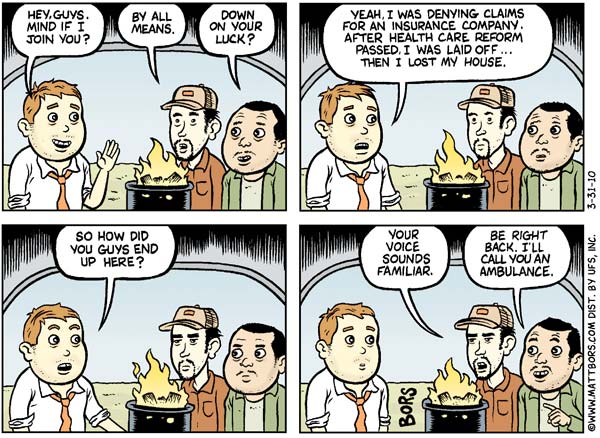
I’m all for scientific advancement in the field of genetics and patenting these genes and lifeforms has made advancement profitable. This has attracted investors and furthered the cause a little bit, but the reality of the situation is gene patents hinder the scientific process more than they help it. When one company owns the rights to a genetic disorder like diabetes they can bar anyone else from using that gene for research or medical testing unless those people pay huge dividends.
Then, consider the case with agriculture. The Monsanto corporation owns the patent to a refined strain of Corn seeds and sues any farmer that is found using their seeds without permission. The problem with this is the way that seeds work. Seeds are naturally built to travel, so the wind may blow Monsanto seeds from one farm to another without the recipient ever having any way to know it happened. Monsanto has agents that travel the American mid-west harassing farmers that do not buy their seeds and trying to run them out of business with legal expenses. The term legalized extortion comes to mind. Learn more about the effects of gene manipulation and patenting in Food, Inc. (Netflix link) (Amazon link), an excellent documentary about the American food industry.
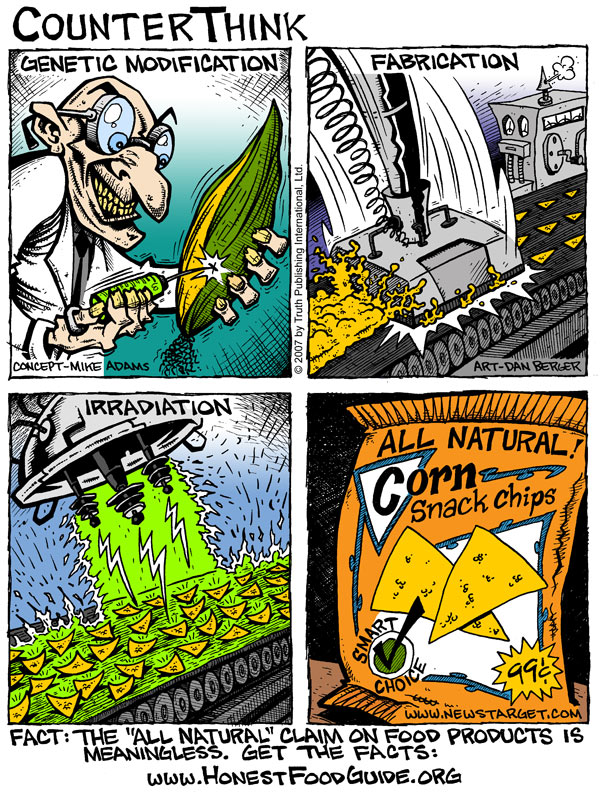
The ownership of information is wrong on so many levels that it should never be allowed. If trade secrets need to be protected, it should be with Privacy laws that everyone can benefit from, not patents. It’s one thing to keep a prototype for the new iPhone secret until it’s ready for sale. And it’s another thing to patent knowledge of the new iPhone and suing people for knowing about it or spreading said knowledge. If the information is the truth (not libelous), then nothing should be able to stop someone from speaking about it. Knowledge is meant to be shared.
Conclusion
Most of these things that have been claimed as property fall into one of three categories.
- I want to keep this secret from the rest of the world so that I can take advantage of their lack of knowledge about it and profit. This is a reprehensible reason because it hinders human growth and evolution. It also creates a hiding place for unethical activity. When knowledge is purposely held away from the general public, it is always wrong.
- I want to squeeze every last cent out of selling something that someone else created and give them as little as possible.
- I can’t make a long-lasting competitive product, so instead I will do everything in my power to restrict people so they can’t easily switch to my competitors who make better products in the future.
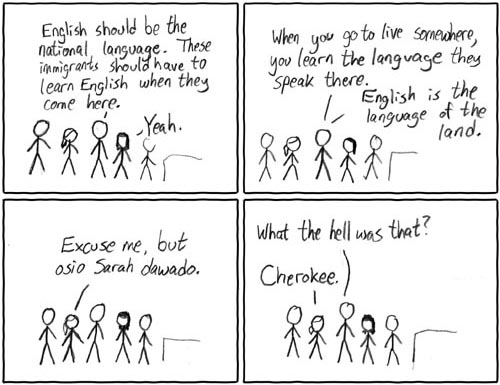
Do these things sound like something that Democracy would want? To me, this looks like big business and big government taking advantage of consumers and up-and-coming entrepreneurs.
